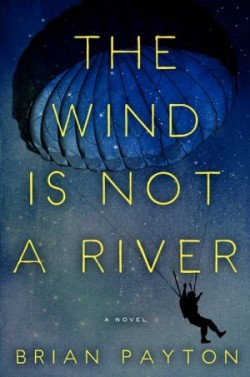The Wind is not a River
By Brian Payton
Harper Collins
$29.99; 308 pages
Reviewed by Margaret Thompson
War has provided storytellers with material for thousands of years. Whatever one’s viewpoint, there is a terrible fascination in extremes; for fiction writers, examining the best and worst of individual behaviour against the collective excesses of armed conflict is irresistible.
Brian Payton’s absorbing second novel, The Wind is not a River, is part of this long tradition. In essence, the novel is a love story played out against the background of a Second World War campaign. That may sound familiar, but there is nothing predictable, from first to last, about Payton’s foray down a well-worn path.
For a start, the campaign is in the northern Pacific, and involves the only battle fought on American soil. Then, Payton’s protagonists are a young, happily married couple living in Seattle. John Easley is a journalist usually occupied with National Geographic projects; his wife, Helen, works in a store. After his sudden puzzling ejection from the Aleutian islands, and his brother’s death, John feels compelled to return to Alaska, despite a quarrel with Helen which both regret.
“Someone wants this battle fought beyond the view of prying eyes. What were they hiding in the Aleutians?…Easley was one of a handful of journalists with any knowledge of this corner of the world. What kind of writer shrinks from such a duty?”
Wearing his brother’s RCAF uniform, John talks his way into the role of an observer in the Aleutian theatre and a flight on a routine sortie. His plane crashes over the island of Attu; he survives, along with 19-year-old Karl Bitburg. Three thousand miles away, Helen struggles with her father’s poor health, and her own growing conviction of her husband’s peril. Despite her complete lack of qualifications, she is hired as part of a USO troupe and sets off on an epic search into the unknown.
Unknown, because Payton’s other protagonist and constant presence in the novel is the terrifying isolation of the Aleutian islands. Flung in an arc from the Alaskan mainland across the North Pacific towards Japan, they are sparsely inhabited. The climate is relentlessly hostile—cold, wind, and fog, rain or snow.
“…it becomes clear that the island does not offer up shelter gladly. Beaches curl round coves and end on rocky headlands. Up from the high tide line are rolling fields of rye slicked tight against the land. Then, after some two hundred feet of elevation gain, snow. Neither tree nor shrub worthy of the term. No bushes laden with summer berries. No grazing cattle or sheep, or even deer, rabbits, or squirrels. The only possible sources of protein are also visitors here—birds of the sky and fish of the sea.”
John’s life is pared to an increasingly desperate struggle to survive.
Payton alternates between John’s and Helen’s narratives, a device which provides momentum and grapples attention. There is a visceral excitement in the race against time as Helen fumbles her way through song and dance routines, moving ever closer to the husband she believes is still alive, while John endures the lonely road to physical and spiritual exhaustion until another quirk in the fortunes of war snatches him south again.
The fact that neither is aware of how close they come is heartrendingly realistic. Like the fog ebbing and flowing over the island, concealing and revealing, the censorship and secrecy about the Aleutian campaign, which ignite John’s journalistic instincts in the first place, and hamper Helen’s dogged search, isolate the couple in an opaque and bewildering world in which the only familiarity or strength lies in memory and belief in love.
Margaret Thompson’s new novel, The Cukoo’s Child will be released shortly.

{ 0 comments… add one now }